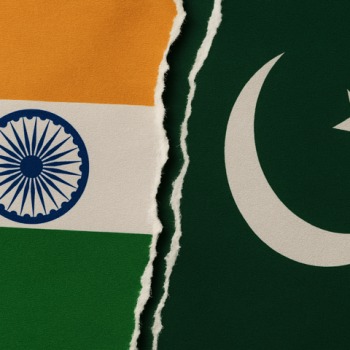by Amer Aziz
So far in 2016, terrorism continues to be perpetrated in Pakistan, the Middle East and the West. Death tolls have mounted in Libya, Egypt, Syria, Iraq, Ankara and now in Brussels and Lahore. The attacks come as a grim reminder that while such acts are perpetrated by a handful of extremists, they have grave repercussions for the rest of us.
Defeating terrorism is, ultimately, a battle of hearts and minds. And, that likely requires us to ask of ourselves some rather difficult questions. Such as, does literalism in orthodox religious ideology play an insidious role cascading into extreme ideas? Literalism that spawns irrational and untenable notions of prophecies in religion.
As the dark realities of the second Iraqi invasion unfolded, The Guardian’s Andrew Brown reported that George Bush “attempted to sell the invasion of Iraq to Jacques Chirac using Biblical prophecy”. Bush told Chirac that he saw Gog and Magog at work in the Middle East. The Protestant Federation of France contacted Old Testament Professor Thomas Romer at the University of Lausanne to decipher the perspective of the born-again Christian U.S. President. This wasn’t the first time. In 1971, Ronald Regan in an address to the California legislature proclaimed how Biblical scholars had been pointing to (evil) Russia as the Gog of the end-times. He likely carried such notions into the White House.
In Revelations: Visions, Prophecies & Politics in The Book of Revelations, bestselling author and Princeton professor Elaine Pagels writes how prophecy has influenced political dispensation through history, and very much does today. A 2002 Time/CNN poll reported that 59% of Americans believed that apocalyptic events in the Book of Revelation would come to pass.
Prophecy-chatter among certain Christian groups plays heavily on portraying Islam and its prophecies of the latter-days Mahdi and Messiah as the Anti-Christ. Many Christians believe that a ‘gathering of nations’ will take place against Israel to coincide with the Second Coming of Christ. Subsequently, the Battle of Armageddon which unfold embroiling Christians into a military conflict with Islam’s Anti-Christ messiah-figure.
Muslims are likewise awaiting the return of Christ also in an epic climax of good versus evil. And like their Christian counterparts, Muslims often make literal interpretations of prophecy. While the vast majority of Muslims rejects extremist ideology, the notion of an imminent conflict and displacement is propagated by Muslim scholars as much as it is in Christianity.
Mirza Ghulam Ahmad (1835-1908) founded The Ahmadiyya Muslim Community. A claimant to the prophecies of the Second Coming of Christ, Ahmad frequently engaged Muslim and Christian scholars in India during his time. He advised them to rationally interpret the symbolism in these prophecies. Ahmad also warned of dire consequences if Muslims and Christians persisted with their literal, dangerous and untenable interpretations. In his book “Jesus in India”, he wrote,
I have written this book so that I might dispel the serious misconceptions which are current among Christians and Muslims…The dangerous consequences of these misconceptions have not only hijacked and destroyed the concept of Divine Unity, but their insidious and poisonous influence has long been noticed in the moral condition of Muslims in this country. It is these baseless myths and tales that result in spiritual maladies like immorality, malice, callousness and cruelty.
Today, a hundred years on , world events appear to be in agreement with his warning.
In the Islamic and Christian traditions, Jesus of Nazareth was Messiah to the Israelites. In a remarkable parallel, the Jews during Jesus’s time expected prophetic fulfillment of the Messiah with fantastical notions of waging war on infidel-Rome and consolidating a kingdom on earth—just as Christians and Muslims expect today. Yet, everyone knows no such dispensation took place. Rather, violence among certain Judaic sects on a mission to cleanse Israel of Rome and those Jews who submitted to her authority reached extreme levels. Jerusalem eventually fell into disarray and suffered destruction at the hands of the Roman armies. History certainly doesn’t support the idea of literal interpretations of prophecy.
Perhaps, being dismissive by casting terrorism as evil or blaming foreign policy on the personal beliefs of a leader would be a folly. As Muslims and Christians, in our common reverence for Christ, we owe it to the spilled blood of innocents to probe deeply into our own ideas and bear their responsibility. And it would give each of us the ability and (ideological) weaponry to make a difference in the war on terror.












